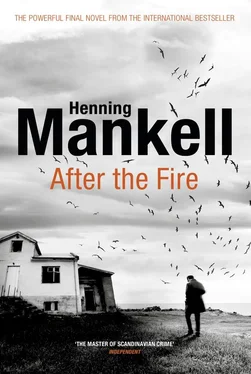No one seemed to have any idea what was going to happen to Oslovski’s house, but one day Jansson paid me an unexpected visit. He clambered up onto the jetty and we sat down on the bench. He had brought a magazine about vintage cars containing both articles and small ads. He turned to the advertising section, with pictures and prices.
He pointed, and I immediately saw what he meant. Oslovski’s car was for sale, and the image had been taken inside her garage. The thieves had photographed the car before they moved it.
Oslovski’s DeSoto Fireflite, manufactured in 1958.
I could still remember her telling me that this particular model had had a short production run — only 4,192. One of the most unusual details was that the exhaust pipe actually came through the bumper. The advert stated that the bodywork was a mixture of Wedgwood Blue and Haze Blue. No price was given; there was a phone number for interested parties to call.
‘How did you find this?’ I asked. ‘I didn’t know you were into old American cars.’
‘My nephew called,’ Jansson said. ‘I’d told him about the break-in and the fact that the car had been stolen. He knows everything about vintage American cars, and he guessed this might be the one. He was right.’
‘You’ve got a nephew?’
Jansson took out his phone and handed it to me instead of replying.
‘It’s best if you call. My voice starts trembling if I get nervous.’
A woman answered.
‘It’s about the car,’ I said. ‘The DeSoto. I was wondering how much it was?’
‘A hundred and eighty-five thousand.’
Her voice sounded muffled, as if she were speaking through a handkerchief.
‘Can you tell me something about the car? Background, previous owners, that kind of thing?’
‘You’ll have to talk to my brother about all that, but he’s not home at the moment.’
‘When will he be back?’
‘I’ve no idea.’
‘Can I come and see the car? Where is it?’
‘You need to talk to my brother.’
‘Surely you can tell me where the car is?’
She saw through me.
‘Try again in a few hours,’ she said dismissively and ended the call.
Jansson had leaned closer to listen in to the conversation; it felt as if we were an old married couple, sitting there on the bench in winter chill.
Two swans flew past. We watched them until they were out of sight.
‘Bastards,’ Jansson said. ‘Stealing a dead woman’s car.’
We went up to the caravan for a cup of coffee, then we played cards. Jansson won every game.
After an hour and a half, by which time we were both tired of playing, I rang the number again. No one answered. In a sudden burst of energy I called the magazine’s advertising desk and informed them that one of the cars on their ‘For Sale’ pages was stolen. The man I spoke to was very concerned and asked me to report it to the police.
I did as he said. When the officer suggested that I report the matter via the police service website, I flared up, telling him I was sitting in a caravan on a remote island, with no internet access.
I don’t think he really grasped my situation. He noted down the details with an air of indifference, as if he wanted to let me know from the start that this was going nowhere and that a prosecutor would immediately dismiss the possibility of an investigation.
Oslovski was like a piece of human flotsam that had drifted onto our shores. Jansson had started a collection for a headstone, but it was difficult to get people to contribute. I think he ended up paying most of the eventual cost himself, but at least I was there when the stone was erected in the churchyard. Oslovski was placed between one of the archipelago’s last pilots, who happened to be a relative of Veronika from the cafe, and a landowner from Röda Furholmen who was notorious for his unpleasant behaviour when he’d been drinking. Occasionally some unknown person would lay flowers on her grave.
In the middle of December a storm swept in across the archipelago. It came from the Baltic to the south-west, and struck with full force in the middle of the night. The gusts of wind were so strong that the caravan shook. I went out into the sleety darkness with my torch, shoring up my home with tree stumps and plastic barrels filled with water. I had just finished and gone back inside when there was a power cut. I undressed and dried myself with a recently purchased towel made in Cambodia. I still had the LPG stove, and I made some coffee in spite of the fact that it was four o’clock in the morning. I had a candle on the table, its flame flickering in the draught.
My telephone rang. I immediately assumed it was Jansson, wanting to know if my electricity had gone too, but instead it was a man speaking English with an accent. I couldn’t work out who it was and thought it must be a wrong number. Then I realised it was Ahmed.
‘I am at the hospital. Louise is having the baby.’
The child was coming, much too soon. I could hear the anxiety in Ahmed’s voice, but he told me there was no need to worry. Louise had asked him to call me; he promised to let me know as soon as the child was born.
I didn’t get any more sleep that night. The child was so premature that it would have to be placed in an incubator. The storm and the hurricane-force gusts outside the caravan felt like an ominous backdrop as I awaited the birth of my first and perhaps only grandchild.
I thought about Harriet. Once again I pictured her making her way across the ice with her wheeled walker. I found it difficult to remember what she had looked like on that occasion, but in my mind’s eye I could picture her as a young woman, back in the days of our messy relationship. I experienced an intense sense of loss. Or perhaps it was longing. Which isn’t quite the same thing.
One night she and I and Louise had slept together in the caravan before it was moved to this spot. Now Harriet was gone, and Louise was lying in a hospital bed in Paris, giving birth to her child.
The candle flickered again, and memories passed through my mind like uneasy shadows. My father was there, my mother, my grandparents — and various women with whom I had had relationships or whom I had never managed to conquer. I was there too, among the shadows. Perhaps I was the one slinking along close to the walls of the caravan, making sure the light never fell on my face?
At ten to six the phone rang again. It was Ahmed: Louise had had a girl. The baby didn’t weigh much, but everything had gone well. She was in an incubator, as I had expected.
Ahmed said the baby looked like me.
That wasn’t true, of course. Newborn babies, especially if they are premature, don’t look like anybody except themselves. They are unfinished sketches that will develop in an unknown direction.
I went out into the darkness and the wind. Still no power. I used the torch to light my way, dizzy with joy. I hadn’t expected to have such strong feelings. I went into the boathouse, with the wind howling and whistling through the gaps. I sat down on one of my grandfather’s old eel traps, which he had used right up until the last year of his life. By now the net was so fragile with age that it tore if I pushed two fingers into one of the holes and spread them apart.
I felt a tremendous urge to tell someone what had happened, but who could I call? Jansson or Lisa Modin. Perhaps Veronika or Oslovski? But Oslovski was dead, and I had never had her phone number anyway.
I tried Lisa, hoping I would wake her. Which I did.
‘You,’ she said. ‘At this hour — what time is it?’
‘Half past six. I’ve just become a grandfather.’
‘Congratulations. Is it a boy or a girl?’
‘A girl.’
‘Did everything go well?’
‘I believe so, but the baby is premature. That always carries risks.’
Читать дальше












